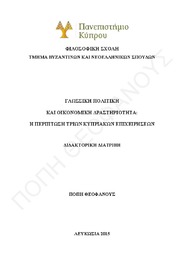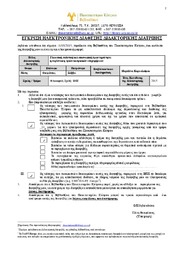| dc.contributor.advisor | Καρυολαίμου, Μαριλένα | el |
| dc.contributor.author | Θεοφάνους, Πόπη Σ. | el |
| dc.coverage.spatial | Κύπρος | el |
| dc.coverage.spatial | Cyprus | en |
| dc.creator | Θεοφάνους, Πόπη Σ. | el |
| dc.date.accessioned | 2015-05-14T06:46:20Z | |
| dc.date.accessioned | 2017-07-28T09:25:28Z | |
| dc.date.available | 2015-05-14T06:46:20Z | |
| dc.date.available | 2017-07-28T09:25:28Z | |
| dc.date.issued | 2015-05 | |
| dc.date.submitted | 2015-05-11 | |
| dc.identifier.uri | https://gnosis.library.ucy.ac.cy/handle/7/38954 | en |
| dc.description | Περιέχει βιβλιογραφία (σ. 221-235). | el |
| dc.description | Αριθμός δεδηλωμένων πηγών στη βιβλιογραφία: 272 | el |
| dc.description | Διατριβή (Διδακτορική) -- Πανεπιστήμιο Κύπρου, Φιλοσοφική Σχολή, Τμήμα Βυζαντινών και Νεοελληνικών Σπουδών, 2015. | el |
| dc.description | Η βιβλιοθήκη διαθέτει αντίτυπο της διατριβής σε έντυπη μορφή. | el |
| dc.description.abstract | Η παρούσα διδακτορική διατριβή εντάσσεται στον ευρύτερο διεπιστημονικό κλάδο της γλωσσικής πολιτικής και του γλωσσικού σχεδιασμού που διερευνά τη σχέση ανάμεσα στη γλώσσα και την οικονομική δραστηριότητα. Πρόκειται για μια κοινωνιογλωσσική έρευνα που εξετάζει τη γλωσσική πολιτική στο πολύγλωσσο περιβάλλον τριών κυπριακών επιχειρήσεων: μιας γαλακτοβιομηχανίας, μιας φαρμακοβιομηχανίας και μιας εταιρείας ανάπτυξης και πώλησης γης. Αποτελεί μια έρευνα μικροσκοπικού πεδίου που διερευνά πώς η οικονομική δραστηριότητα των επιχειρήσεων, όπου κύριος σκοπός είναι η αύξηση του κύκλου εργασιών και η μεγιστοποίηση του κέρδους, επηρεάζει τις γλωσσικές επιλογές στη διεκπεραίωση της προφορικής και γραπτής επικοινωνίας. Για την έρευνα χρησιμοποιήθηκε μικτή μεθοδολογία, δηλαδή συλλέχθηκαν, αναλύθηκαν και συνδυάστηκαν ποιοτικά και ποσοτικά δεδομένα με σκοπό την μεθοδολογική τριγωνοποίηση. Συλλέχθηκαν, επίσης, ποικίλα άλλα τεκμήρια όπως έγγραφα που αφορούσαν αγγελίες για διάφορες θέσεις εργασίας, διαφημιστικά φυλλάδια και φωτογραφικό υλικό. Για την ανάλυση των δεδομένων επιλέγηκε το θεωρητικό πλαίσιο της γλωσσικής διαχείρισης όπως αναπτύχθηκε από τους Spolsky (2004, 2009) και Shohamy (2006). Σύμφωνα με το πλαίσιο αυτό, η γλωσσική πολιτική αποτελεί σύνθετη έννοια που συγκροτείται από τις ακόλουθες τρεις συνιστώσες: τις γλωσσικές πεποιθήσεις, τις γλωσσικές πρακτικές και τη γλωσσική διαχείριση. Όπως προέκυψε από την ανάλυση των δεδομένων που αφορούν τις τρεις αυτές συνιστώσες και στις τρεις εταιρείες υπάρχει συγκεκριμένη γλωσσική πολιτική η οποία όμως έχει χαρακτήρα υπόρρητο και συγκεκαλυμμένο. Αυτή η πολιτική αφορά κυρίως τη διαμόρφωση ενός κοινού πλαισίου διαχείρισης της αγγλικής γλώσσας, με ενέργειες που είναι σε μεγάλο βαθμό συστηματικές και συνειδητές και διασφαλίζουν στην αγγλική μια κυρίαρχη θέση και έναν εξέχοντα ρόλο στο πεδίο των επιχειρήσεων. Παράλληλα, διαμορφώνεται ένα κοινό πλαίσιο αναφοράς στην αγγλική γλώσσα, που συνίσταται σε μια συλλογική συναινετική αντίληψη του ρόλου της αγγλικής ως εταιρικής γλώσσας στην οποία προσχωρούν όλοι οι εργαζόμενοι –όπως άλλωστε διαφαίνεται και από τις εκπεφρασμένες γλωσσικές τους πεποιθήσεις. Πέρα από τις τακτικές που ευνοούν τη μονογλωσσία λόγω της γενικευμένης χρήσης της αγγλικής, καταγράφηκαν και στις τρεις επιχειρήσεις εναλλακτικά επικοινωνιακά σενάρια που αφήνουν να διαφανούν πρακτικές που ευνοούν την πολυγλωσσία. Η ελληνική, για παράδειγμα, κατέχει σημαντική θέση στις επιχειρήσεις, ωστόσο, η χρήση της δεν διαχέεται σε όλο το φάσμα λειτουργιών των επιχειρήσεων, αλλά σχετίζεται με συγκεκριμένες επιχειρησιακές περιστάσεις και λειτουργίες. Σε δύο από τις τρεις επιχειρήσεις (γαλακτοβιομηχανία και φαρμακοβιομηχανία) εντοπίστηκαν, επιπλέον, γλωσσικές χρήσεις που θεωρούμε ότι αποτελούν ψήγματα πολύγλωσσης πρακτικής. Στις περιπτώσεις αυτές, η εισαγωγή και η χρήση ξένων γλωσσών αφορούσε μεμονωμένα περιστατικά που αντιμετωπίζονταν με συγκυριακές και όχι συστηματικές ρυθμίσεις. Η τρίτη επιχείρηση (πώληση και ανάπτυξη γης) διαφοροποιήθηκε έντονα σε σχέση με τις άλλες δύο, υιοθετώντας συνειδητά μια φιλοσοφία πολύγλωσσης επιχείρησης, που αντιμετωπίζει την πολυγλωσσία θετικά εντάσσοντας την με επιτυχία στα επιχειρησιακά σχέδια και καθιστώντας την στρατηγικό πλεονέκτημα. Η έρευνα κατέδειξε, τέλος, πώς οι πολύγλωσσες πρακτικές συνδέονται με το είδος της επιχειρησιακής δραστηριότητας, με τις ιδιαιτερότητες της διαπροσωπικής επικοινωνίας και με την εταιρική φιλοσοφία εν γένει. | el |
| dc.description.abstract | This thesis belongs to the wider interdisciplinary field of language policy and planning that examines the relationship between language and economic activity. It is a sociolinguist survey that studies language policy in the multilingual context of three Cypriot companies: in a company selling dairy products, in a pharmaceutical company and in a property development company. It is, thus, a micro-linguistic survey exploring the ways in which economic activity in enterprises, where the main aim is to increase economic activities and maximize profit, influences language choices in oral and written interaction. For this purpose a mixed research methodology was used by collecting, analyzing and combining qualitative and quantitative data to obtain triangulation of results. Other data collected were job advertisements, brochures and photographic material. The theoretical framework used for the analysis of the data was language management theory (Spolsky 2004, 2009 and Shohamy 2006), whereby language policy is considered as a threefold activity comprising of the following interrelated components: language beliefs, language management and language practices. The data analysis for the three aforementioned components confirms that all three companies exert a specific language policy as although in an implicit and covert manner. The policy in question concerns primarily the adoption of a common language management approach as far as the English language is concerned with consistent and deliberate actions that establish a dominant place and a preeminent role to the English language. At the same time, a common framework of reference to English is formed which consists of a collectively consensual understanding of the role of English as a corporative language, as it is shown in the analysis of the expressed language beliefs of employees. Besides monolingual practices that arose from the extensive use of English, alternative language scenarios that promoted multilingualism emerged as well. Greek played a significant role in all three companies, although its use did not cover the whole spectrum of economic activities but only specific kinds of interactions and functions. Beyond the use of Greek, in two of the three companies (the dairy products company and the pharmaceutical company) language usages that might be seen as examples of multilingual practices were traced were tracked. Nevertheless, it must be noted that these multilingual practices concerned isolated cases that were dealt ad hoc and were not the result of systematic planning. The property development company constituted a clearly distinct case, since it evaluated multilingual practices positively and adopted a multilingual philosophy successfully integrating multilingualism in its activity plans, thus turning it into a strategic advantage. Lastly, the research showed that multilingual practices are closely connected to the type of economic activity, the specificities of interpersonal communication and the wider corporative philosophy of the enterprise. | en |
| dc.format.extent | xiv, 244 σ. : εικ. (μερ. έγχρ.) ; 30 εκ. | el |
| dc.language.iso | gre | en |
| dc.publisher | Πανεπιστήμιο Κύπρου, Φιλοσοφική Σχολή / University of Cyprus, Faculty of Letters | |
| dc.rights | info:eu-repo/semantics/openAccess | en |
| dc.rights | Open Access | en |
| dc.subject.lcsh | Sociolinguistics | en |
| dc.subject.lcsh | Business communication Cyprus | en |
| dc.subject.lcsh | Communication in organizations Cyprus | en |
| dc.subject.lcsh | Language policy Cyprus | en |
| dc.subject.lcsh | Business enterprises Cyprus | en |
| dc.subject.lcsh | Multilingualism Cyprus | en |
| dc.subject.lcsh | Intercultural communication Cyprus | en |
| dc.subject.lcsh | Commercial correspondence Cyprus | en |
| dc.title | Γλωσσική πολιτική και οικονομική δραστηριότητα : η περίπτωση τριών κυπριακών επιχειρήσεων | el |
| dc.title.alternative | Language policy and economic activity: the case of three Cypriot enterprises | en |
| dc.type | info:eu-repo/semantics/doctoralThesis | en |
| dc.contributor.committeemember | Αγαπητός, Παναγιώτης | el |
| dc.contributor.committeemember | Τσαμαδού – Jacoberger, Ειρήνη | el |
| dc.contributor.committeemember | Κατσογιάννου, Μαριάννα | el |
| dc.contributor.committeemember | Agapitos, Panayiotis | en |
| dc.contributor.committeemember | Tsamadou – Jacoberger, Irini | en |
| dc.contributor.committeemember | Katsoyiannou, Marianna | en |
| dc.contributor.committeemember | Baider, Fabienne | en |
| dc.contributor.department | Πανεπιστήμιο Κύπρου, Φιλοσοφική Σχολή, Τμήμα Βυζαντινών και Νεοελληνικών Σπουδών | el |
| dc.contributor.department | University of Cyprus, Faculty of Letters, Department of Byzantine and Modern Greek Studies | en |
| dc.subject.uncontrolledterm | ΓΛΩΣΣΙΚΗ ΠΟΛΙΤΙΚΗ | el |
| dc.subject.uncontrolledterm | ΟΙΚΟΜΙΚΗ ΔΡΑΣΤΗΡΙΟΤΗΤΑ | el |
| dc.subject.uncontrolledterm | ΚΟΙΝΩΝΙΟΓΛΩΣΣΙΚΗ ΕΡΕΥΝΑ | el |
| dc.subject.uncontrolledterm | ΜΙΚΡΟΣΚΟΠΙΚΗ OΠΤΙΚΗ | el |
| dc.subject.uncontrolledterm | ΚΟΙΝΩΝΙΟΓΛΩΣΣΙΚΟ ΠΕΔΙΟ ΤΩΝ ΕΠΙΧΕΙΡΗΣΕΩΝ | el |
| dc.subject.uncontrolledterm | ΜΟΝΟΓΛΩΣΣΙΑ-ΠΟΛΥΓΛΩΣΣΙΑ | el |
| dc.subject.uncontrolledterm | ΓΛΩΣΣΙΚΕΣ ΠΕΠΟΙΘΗΣΕΙΣ, ΓΛΩΣΣΙΚΗ ΔΙΑΧΕΙΡΙΣΗ, ΓΛΩΣΣΙΚΕΣ ΠΡΑΚΤΙΚΕΣ | el |
| dc.subject.uncontrolledterm | ΜΗΧΑΝΙΣΜΟΙ | el |
| dc.subject.uncontrolledterm | LANGUAGE POLICY | en |
| dc.subject.uncontrolledterm | ECONOMIC ACTIVITY | en |
| dc.subject.uncontrolledterm | SOCIOLINGUISTIC RESEARCH | en |
| dc.subject.uncontrolledterm | MICRO-LINGUISTIC PERSPECTIVE | en |
| dc.subject.uncontrolledterm | THE BUSINESS DOMAIN | en |
| dc.subject.uncontrolledterm | MONOLINGUALISM-MULTILINGUALISM | en |
| dc.subject.uncontrolledterm | LANGUAGE BELIEFS, LANGUAGE MANAGEMENT, LANGUAGE PRACTICES | en |
| dc.subject.uncontrolledterm | MECHANISMS | en |
| dc.identifier.lc | P40.45.C93T54 2015 | en |
| dc.author.faculty | Φιλοσοφική Σχολή / Faculty of Letters | |
| dc.author.department | Tμήμα Βυζαντινών και Νεοελληνικών Σπουδών / Department of Byzantine and Modern Greek Studies | |
| dc.type.uhtype | Doctoral Thesis | en |
| dc.rights.embargodate | 2017-05-11 | |
| dc.contributor.orcid | Καρυολαίμου, Μαριλένα [0000-0003-0914-5794] | |


